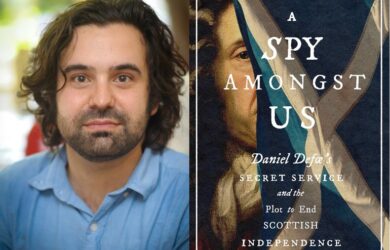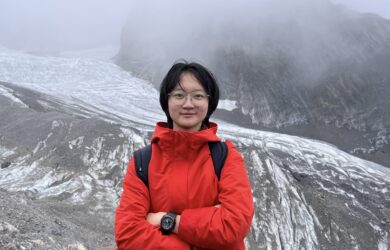Not only are the two New Zealanders independently doing amazing things – Forsyth is working in the UK Prime Minister’s Strategy Unit and Scott has a portfolio career which includes having written a highly acclaimed debut memoir about her childhood in Botswana – but they have come together to form a series of networks to help young graduates with lots of ideas gain access to those who can do something to put them into action.
The two have just launched Stirr London, a forum bringing together investment bankers, politicians, non-governmental organisations, think tanks and scholars to address the major challenging issues of our time in a way that, says Forsyth, “breaks down the silos between the different groups”. The first session in March was on climate change and drew 65 people, including visitors from the US and Israel.
“The aim is to recreate the Cambridge experience,” says Forsyth, “where people from all disciplines and backgrounds who would not otherwise meet come together at their College dining table. Once they move into the real world they tend to discuss issues in their own professional silo. We wanted to ensure the kind of dialogue that happened at Cambridge continues afterwards.”
This is just one of the social enterprise projects Scott and Forsyth are working on in their spare time, but all have a common thread running through them: to give positive opportunities in the world outside university to bright students who want to combine their intellectual passion with their commitment to social transformation.
Their main project is oneleep.com, which aims to give students who may not enjoy the benefits of being part of the old boys’ network or may come from countries outside the US/UK power axis, the ability to feed their ideas through directly to those who can do something about them.
“The aim is to provide a resource that can be a real social leveller,” says Forsyth. “It connects bright young individuals with talent and ideas but without the right networks to take things further to senior investors and others who can make them a reality.”
OneLeep has a series of profiles of successful business people and other ‘influentials’ arranged according to their interest areas. Beside each person is a price which reflects the value of their time. The people have agreed to be contacted direct with ideas from OneLeep users. The money paid, less a commission, is divided half and half between the charities of the person receiving the message and the person sending the message.
“The price is used as a filter to ensure time-poor influentials receive high-quality targeted messages, while giving a broader range of people access to otherwise hard-to-access people who can help develop their ideas or talent. Some people think this is very unBritish, but it gets around the old boys’ network aspect of getting your ideas heard,” says Forsyth.
Old boys’ networks can be imperfect for the old boys and girls too. Through OneLeep, they get access to ideas and talent from outside their networks; from anywhere in the world – opportunities they’d simply not otherwise come across.
The site is currently being tested in collaboration with the Judge Business School and the project has been offered £150,000 of investment. It could be up and running within a year.
In the meantime, both Scott and Forsyth are running the projects alongside their other jobs. The two didn’t meet while studying at Cambridge. Forsyth did an MBA in 2007 and Scott finished her MPhil in Bioscience Enterprise in 2005. They met when Scott was invited to speak at a Gates scholars event about her highly acclaimed autobiographical book, Twenty Chickens for a Saddle: The Story of an African Childhood. The book tells of her unconventional childhood in Botswana, growing up with her father who was a flying doctor and being homeschooled by her mum. It has been described as “the nearest thing you will get to Gerald Durrell’s My Family and Other Animals in Africa and just as enchanting”. The two spoke after the talk and “really hit it off”. They had a common interest in how you establish yourself in the world of work as an outsider and wanted to work for the public good. They had previously worked on a portfolio of different jobs – Forsyth, for instance, had been a diplomat and international trade negotiator before coming to Cambridge. Both had previously been involved with social entrepreneurship. Forsyth, who studied law at the University of Otago, had set up a national human rights programme in New Zealand promoting human rights law to law students to encourage them to become advocates. Scott, who studied Bioinformatics at the University of Auckland, had set up a southern-Africa-based NGO, Mothers for All, which teaches entrepreneurship and income generation skills to women who care for Aids orphans and helps them sell their products online. It uses the women’s personal stories to connect with people who might be put off just by reading the bald statistics about Aids in the region. The organisation supports around 400 orphans and is constantly growing – a new project will distribute cheap solar devices to women in southern Africa, for instance.
Both talk about social entrepreneurship as not being about setting up businesses necessarily. “It’s about the way we address ideas and how we change perceptions,” says Scott.
The two Gates alumni admit that balancing their new projects alongside their current commitments can be “a bit of a juggle”, but say it is also exciting. Forsyth says working in the Prime Minister’s Strategy Unit provides “a fantastic helicopter view of how things come together across the economy and society”. In addition to her Mothers for All work, Scott is writing two books – a non-fiction book about a maximum security prison in South Africa where the prisoners have adopted Aids orphans. The book has already attracted the attention of film-makers; and a novel. She is also working as an ambassador for the Access to Medicine Index which has received funding from the Gates Foundation. It highlights efforts by pharmaceutical companies to help close the gap in access to medicine between developing and developed countries and encourages them and their stakeholders to do more. Scott’s research at Cambridge focused on pricing of Aids drugs and she says it is a privilege to work for the Access to Medicine Index. She is hopeful about the future and says there has been “a sea change” in the way pharmaceutical companies approach the issue of access to medicine over the last 18 months.
Both Scott and Forsyth are keen to emphasise the importance of their experience as Gates scholars in shaping what they have done since. Forsyth mentions that during his time at Cambridge the mission of the scholarship – to use the opportunities it provided to transform society – served as an inspiring example of what could be done. Scott says: “We want to use the Gates platform in new and creative ways. We believe OneLeep and Stirr will be some of the first among many partnerships, companies and organisations to arise from the scholarship’s superb network.”












